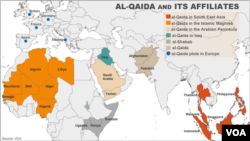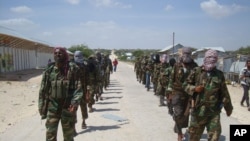Their online videos often feature scenes of violence – improvised explosive devices going off in Afghanistan, snipers hooting at American troops or scenes of jihadists training in an unidentified wilderness. The video is often coupled with appeals to the Quran and statements by the leader of an Islamic extremist group.
But what are these groups really after? Is it world domination or something else?
ASU Study
To try to answer those questions, a recent study sampled more than 2,000 messages posted by al-Qaida and other extremist groups between 1998 and 2011. The study was done by Arizona State University's Center for Strategic Communications. Steven R. Corman is the Herberger professor at Arizona State and one of the study’s authors.
'It may be that the Islamists really do want to take over the world, but that’s not what we’re studying," Corman said. "We are looking at what they say they want to do.”
The sampling included more than 1,500 quotes from the Quran and identified the chapter (surah) and verse the quotes referred to. They were then sorted according to the way they were used – either as exhortations, battle imperatives or affirmations of the faith.
One verse used only rarely was the so-called “Verse of the Sword” from Surah 9:5:
But when the forbidden months are past, then fight and slay the pagans wherever you find them, and seize them, beleaguer them, and lie in wait for them in every stratagem (of war); but if they repent and establish prayers and pay the alms, then open the way for them: for God is Forgiving, Merciful.
“You know that’s arguably the most violent verse exhorting the faithful to kill the pagans wherever they find them,” Corman said. “And extremists both violent and non-violent do invoke that verse sometimes. But when you look at the big picture, it’s just not a prominent part of the religious justification for what the violent extremists are doing.”
Narrative types
Corman said that the focus of the extremist rhetoric is often the moderate Muslims who do not support or oppose the extremists’ agenda.
Corman and his co-authors, Jeffry R. Halverson and R. Bennett Furlow, found that certain story forms were common in extremist communications. These include the so-called “deliverance story”, where an oppressor threatens the community and a champion emerges to defeat the threat and deliver the community. A classic example is the story of David and Goliath from both the Bible and the Quran.
“That’s an effective story form because it gives people hope that no matter how bad things are, a champion can step forward to save them,” Steven Corman said.
.
The extremist postings also had common themes of victimization, dishonor and retribution. The idea of Islamists wanting world domination was not found. However, Corman said that that does not mean that such rhetoric was not present.
“There are cases where extremists are talking about world domination and it’s easy to focus on that,” he said. “And this fits with an existing story form in the West that comes from the Cold War – you know that was about another evil force that sought to impose themselves everywhere."
Recommendations
The study recommends that western leaders abandon claims that Islamists seek world domination and focus instead on addressing the grievances the groups use for the argument of victimization. It also says alternative means of deliverance should be put forth and the image of extremists as “champions” for Islam be disproved.
However, Corman says extremists are not likely to listen to western counter-arguments.
“The important audience is the one that they’re trying to influence – it’s these contested populations that don’t necessarily support or oppose them,” Corman said. “And that involves reframing or redirecting the grievances that people have, proposing alternate ways to address the grievances, and especially undermining the image of these violent groups as champions.”
“The fact is they haven’t done anything in the last 12 years that is really champion-like at all,” Corman said.
Dissenting opinions
The findings challenge the so-called “Clash of Civilizations” theory first put forth by political scientist Samuel P. Huntington in 1993. In this theory, the primary axis of conflict is along cultural and religious lines, instead of economic or political ones.
Huntington said that while nation states will remain the main actors in world affairs, the primary conflicts will be along religious and cultural lines.
The idea has been used to cast conflict with Islamic extremists as one between the “peaceful” West and military Islam.
Pamela Geller is an American blogger, author and commentator. She has written several controversial articles on her blog “Atlas Shrugs.” She is also the author of Stop the Islamization of America: A Practical Guide to the Resistance and The Post-American Presidency: The Obama Administration's War on America with Robert Spencer.
Geller said that the ASU study is not realistic or representative.
“It is seriously ignorant,” she said. “The jihad groups cast all their contemporary jihads as defensive today, because only the caliph can declare offensive jihad, and there is no caliph. The [authors] mistook the paucity of citation of offensive jihad verses as meaning that the jihadis were not interested in offensive jihad, when actually it only means that they are aware that only defensive jihad can be justified theologically at this time.”
Asked about the study’s emphasis only on what the extremists say in communications, Geller said extremist groups “have been clear about wishing to restore the caliphate and unite the Islamic nations under its umbrella. This study clouds that rather obvious fact.”
When asked about recent political gains made by Islamist parties in Egypt, Tunisia and other so-called “Arab Spring” countries, Geller said that western governments “should not stand for Sharia governments and should defend the human rights of women, non-Muslims and apostates to Islam in Sharia societies.”
Regional focuses?
Recent counter-terrorism reports say that the United States should focus its efforts on northern Africa, from Somalia through Niger and Chad and into Nigeria.
One report cited inroads made by such groups as Boko Haram, and al-Qaida in the Islamic Maghreb. U.S. Defense Secretary Leon Panetta cited Africa as one region where terrorism is trying to get a foothold.
The State Department’s annual report on terrorism said extremist groups have been exploiting the instability in Mali and Libya.
The U.S focus appears to be sending equipment and training to help Africans combat extremism. Whether the strategy includes changing the narrative of local Muslims to counteract extremist rhetoric remains an open question.
But what are these groups really after? Is it world domination or something else?
ASU Study
To try to answer those questions, a recent study sampled more than 2,000 messages posted by al-Qaida and other extremist groups between 1998 and 2011. The study was done by Arizona State University's Center for Strategic Communications. Steven R. Corman is the Herberger professor at Arizona State and one of the study’s authors.
'It may be that the Islamists really do want to take over the world, but that’s not what we’re studying," Corman said. "We are looking at what they say they want to do.”
The sampling included more than 1,500 quotes from the Quran and identified the chapter (surah) and verse the quotes referred to. They were then sorted according to the way they were used – either as exhortations, battle imperatives or affirmations of the faith.
'It may be that the Islamists really do want to take over the world, but that’s not what we’re studying. We are looking at what they say they want to do.Steven Corman, Arizona State University
One verse used only rarely was the so-called “Verse of the Sword” from Surah 9:5:
But when the forbidden months are past, then fight and slay the pagans wherever you find them, and seize them, beleaguer them, and lie in wait for them in every stratagem (of war); but if they repent and establish prayers and pay the alms, then open the way for them: for God is Forgiving, Merciful.
“You know that’s arguably the most violent verse exhorting the faithful to kill the pagans wherever they find them,” Corman said. “And extremists both violent and non-violent do invoke that verse sometimes. But when you look at the big picture, it’s just not a prominent part of the religious justification for what the violent extremists are doing.”
Narrative types
Corman said that the focus of the extremist rhetoric is often the moderate Muslims who do not support or oppose the extremists’ agenda.
Corman and his co-authors, Jeffry R. Halverson and R. Bennett Furlow, found that certain story forms were common in extremist communications. These include the so-called “deliverance story”, where an oppressor threatens the community and a champion emerges to defeat the threat and deliver the community. A classic example is the story of David and Goliath from both the Bible and the Quran.
“That’s an effective story form because it gives people hope that no matter how bad things are, a champion can step forward to save them,” Steven Corman said.
.
The extremist postings also had common themes of victimization, dishonor and retribution. The idea of Islamists wanting world domination was not found. However, Corman said that that does not mean that such rhetoric was not present.
“There are cases where extremists are talking about world domination and it’s easy to focus on that,” he said. “And this fits with an existing story form in the West that comes from the Cold War – you know that was about another evil force that sought to impose themselves everywhere."
Recommendations
The study recommends that western leaders abandon claims that Islamists seek world domination and focus instead on addressing the grievances the groups use for the argument of victimization. It also says alternative means of deliverance should be put forth and the image of extremists as “champions” for Islam be disproved.
However, Corman says extremists are not likely to listen to western counter-arguments.
“The important audience is the one that they’re trying to influence – it’s these contested populations that don’t necessarily support or oppose them,” Corman said. “And that involves reframing or redirecting the grievances that people have, proposing alternate ways to address the grievances, and especially undermining the image of these violent groups as champions.”
“The fact is they haven’t done anything in the last 12 years that is really champion-like at all,” Corman said.
Dissenting opinions
The findings challenge the so-called “Clash of Civilizations” theory first put forth by political scientist Samuel P. Huntington in 1993. In this theory, the primary axis of conflict is along cultural and religious lines, instead of economic or political ones.
Huntington said that while nation states will remain the main actors in world affairs, the primary conflicts will be along religious and cultural lines.
The idea has been used to cast conflict with Islamic extremists as one between the “peaceful” West and military Islam.
Pamela Geller is an American blogger, author and commentator. She has written several controversial articles on her blog “Atlas Shrugs.” She is also the author of Stop the Islamization of America: A Practical Guide to the Resistance and The Post-American Presidency: The Obama Administration's War on America with Robert Spencer.
Geller said that the ASU study is not realistic or representative.
“It is seriously ignorant,” she said. “The jihad groups cast all their contemporary jihads as defensive today, because only the caliph can declare offensive jihad, and there is no caliph. The [authors] mistook the paucity of citation of offensive jihad verses as meaning that the jihadis were not interested in offensive jihad, when actually it only means that they are aware that only defensive jihad can be justified theologically at this time.”
Asked about the study’s emphasis only on what the extremists say in communications, Geller said extremist groups “have been clear about wishing to restore the caliphate and unite the Islamic nations under its umbrella. This study clouds that rather obvious fact.”
When asked about recent political gains made by Islamist parties in Egypt, Tunisia and other so-called “Arab Spring” countries, Geller said that western governments “should not stand for Sharia governments and should defend the human rights of women, non-Muslims and apostates to Islam in Sharia societies.”
Regional focuses?
Recent counter-terrorism reports say that the United States should focus its efforts on northern Africa, from Somalia through Niger and Chad and into Nigeria.
One report cited inroads made by such groups as Boko Haram, and al-Qaida in the Islamic Maghreb. U.S. Defense Secretary Leon Panetta cited Africa as one region where terrorism is trying to get a foothold.
The State Department’s annual report on terrorism said extremist groups have been exploiting the instability in Mali and Libya.
The U.S focus appears to be sending equipment and training to help Africans combat extremism. Whether the strategy includes changing the narrative of local Muslims to counteract extremist rhetoric remains an open question.










